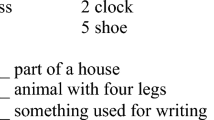Abstract
It has been widely acknowledged that vocabulary plays a significant role in second language acquisition. To a large degree, learners’ improvement in L2 acquisition depends on their progress in acquiring individual words and word parts (Barcroft, 2004). Meara and Fitzpatrick (2000) claimed that communicative effectiveness can be achieved more successfully by learners with a larger vocabulary pool than by those with a more detailed command of a smaller one.
Access this chapter
Tax calculation will be finalised at checkout
Purchases are for personal use only
Preview
Unable to display preview. Download preview PDF.
Similar content being viewed by others
References
Barcroft, J. (2004). Effects of sentence writing in second language lexical acquisition. Second Language Research, 20(4), 303–334.
Dale, E. (1965). Vocabulary measurement: Techniques and major findings. Elementary English, 42, 895–901, 948.
Duan, S., & Yan, C. (2004). Effects of multiple-choice annotation on ESL incidental vocabulary acquisition. Foreign Language Teaching and Research, 3, 213–218.
Gai, S. (2003). An empirical study on L2 incidental vocabulary acquisition by English-major students. Foreign Language Teaching and Research, 4, 282–286.
Heatley, A., Nation, I. S. P., & Coxhead, A. (2002). Range [Computer software]. Retrieved from http://www.victoria.ac.nz/lals/staff/paul-nation/nation.aspx
Laufer, B., & Goldstein, Z. (2004). Testing vocabulary knowledge: Size, strength, and computer adaptiveness. Language Learning, 54(3), 399–436.
Laufer, B., & Nation, P. (1995). Vocabulary size and use: Lexical richness in L2 written production. Applied Linguistics, 16(3), 307–322.
Laufer, B., & Nation, P. (1999). A vocabulary size test of controlled productive ability. Language Testing, 16(1), 33–51.
Laufer, B., & Paribakht. T. S. (1998). The relationship between passive and active vocabularies: Effects of language learning context. Language Learning, 48(3), 365–391.
Meara, M. P., & Alcoy, C. O. J. (2010). Words as species: An alternative approach to estimating productive vocabulary size. Reading in a Foreign Language, 22(1), 222–236.
Meara, P., & Fitzpatrick, T. (2000). Lex30: An improved method of assessing productive vocabulary in an L2. System, 28, 19–30.
Nation, I. S. P. (1983). Testing and teaching vocabulary. Guidelines, 5(1), 12–25.
Nation, I. S. P. (1984). Vocabulary lists. Wellington: Victoria University of Wellington, English Language Institute.
Nation, I. S. P. (1990). Teaching and learning vocabulary. New York, NY: Heinle & Heinle.
Nation, I. S. P., & Heatley, A. (1994). Range: A program for the analysis of vocabulary in texts [software]. Retrieved from http://www.victoria.ac.nz/lals/staff/paul-nation/nation.aspx
Paribakht, T. S., & Wesche, M. (1997). Vocabulary enhancement activities and reading for meaning in second language acquisition. In J. Coady & T. Huckin (Eds.), Second language vocabulary acquisition (pp. 174–200). Cambridge, UK: Cambridge University Press.
Read, J. (1993). The development of a new measure of L2 vocabulary knowledge. Language Testing, 10(3), 356–371.
Read, J. (2004). Plumbing the depths: How should the construct of vocabulary knowledge be defined? In P. Bogaards & B. Laufer (Eds.), Vocabulary in a second language: Selection, acquisition and testing (pp. 209–227). Amsterdam: John Benjamins.
Schmitt, N., & Meara, P. (1997). Researching vocabulary through a word knowledge framework: Word associations and verbal suffixes. Studies in Second Language Acquisition, 19(1), 17–36.
Schmitt, N., Schmitt, D., & Clapham, C. (2001). Developing and exploring the behavior of two new versions of the Vocabulary Levels Test. Language Testing, 18(1), 55–88.
Tan, X. (2007). Study on the development of L2 learners’ depth of productive vocabulary. Foreign Language Education, 28(2), 52–56.
Webb, S. (2005). Receptive and productive vocabulary learning: The effects of reading and writing on word knowledge. Studies in Second Language Acquisition, 27, 33–52.
Webb, S. (2007). The effects of repetition on vocabulary knowledge. Applied Linguistics, 28(1), 46–65.
Wesche, M., & Paribakht, T. S. (1996). Assessing second language vocabulary knowledge: Depth versus breadth. The Canadian Modern Language Review, 53, 13–40.
Xue, G., & Nation, I. S. P. (1984). A university word list. Language Learning and Communication, 3(2), 215–229.
Zareva, A., Schwanenflugel, P., & Nikolova, Y. (2005). Relationship between lexical competence and language proficiency: Variable sensitivity. Studies in Second Language Acquisition, 27(4), 567–595.
Editor information
Editors and Affiliations
Rights and permissions
Copyright information
© 2016 Sense Publishers
About this chapter
Cite this chapter
Yue, Y., Fan, S. (2016). Measurement of Vocabulary Knowledge. In: Fan, S., Fielding-Wells, J. (eds) What is Next in Educational Research?. SensePublishers, Rotterdam. https://doi.org/10.1007/978-94-6300-524-1_16
Download citation
DOI: https://doi.org/10.1007/978-94-6300-524-1_16
Publisher Name: SensePublishers, Rotterdam
Online ISBN: 978-94-6300-524-1
eBook Packages: EducationEducation (R0)




